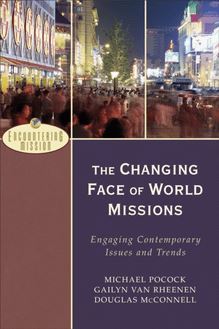Effective Intercultural Communication (Encountering Mission) , livre ebook
315
pages
English
Ebooks
2014
Vous pourrez modifier la taille du texte de cet ouvrage
Obtenez un accès à la bibliothèque pour le consulter en ligne En savoir plus
Découvre YouScribe en t'inscrivant gratuitement
Découvre YouScribe en t'inscrivant gratuitement
315
pages
English
Ebooks
2014
Vous pourrez modifier la taille du texte de cet ouvrage
Obtenez un accès à la bibliothèque pour le consulter en ligne En savoir plus
Publié par
Date de parution
14 octobre 2014
Nombre de lectures
0
EAN13
9781441245939
Langue
English
Poids de l'ouvrage
1 Mo
Publié par
Date de parution
14 octobre 2014
Nombre de lectures
0
EAN13
9781441245939
Langue
English
Poids de l'ouvrage
1 Mo
A. Scott Moreau, series editor
Also in the series:
Introducing World Missions: A Biblical, Historical, and Practical Survey, 2nd Edition
A. Scott Moreau, Gary R. Corwin, and Gary B. McGee
The Changing Face of World Missions: Engaging Contemporary Issues and Trends
Michael Pocock, Gailyn Van Rheenen, and Douglas McConnell
Encountering Missionary Life and Work: Preparing for Intercultural Ministry
Tom Steffen and Lois McKinney Douglas
Christianity Encountering World Religions: The Practice of Mission in the Twenty-first Century
Terry Muck and Frances S. Adeney
Encountering Theology of Mission: Biblical Foundations, Historical Developments, and Contemporary Issues
Craig Ott and Stephen J. Strauss with Timothy C. Tennent
Developing a Strategy for Missions: A Biblical, Historical, and Cultural Introduction
John Mark Terry and J. D. Payne
Encountering the History of Missions
John Mark Terry and Robert L. Gallagher
Intercultural Discipleship
W. Jay Moon
© 2014 by A. Scott Moreau, Evvy Hay Campbell, and Susan Greener
Published by Baker Academic
a division of Baker Publishing Group
P.O. Box 6287, Grand Rapids, MI 49516-6287
www.bakeracademic.com
Ebook edition created 2014
Ebook corrections 09.05.2017
All rights reserved. No part of this publication may be reproduced, stored in a retrieval system, or transmitted in any form or by any means—for example, electronic, photocopy, recording—without the prior written permission of the publisher. The only exception is brief quotations in printed reviews.
Library of Congress Cataloging-in-Publication Data is on file at the Library of Congress, Washington, DC.
ISBN 978-1-4412-4593-9
Unless otherwise indicated, Scripture quotations are from the Holy Bible, New International Version®. NIV®. Copyright © 1973, 1978, 1984, 2011 by Biblica, Inc.™ Used by permission of Zondervan. All rights reserved worldwide. www.zondervan.com
Scripture quotations labeled CEV are from the Contemporary English Version © 1991, 1992, 1995 by American Bible Society. Used by permission.
Contents
Cover
Series Page
Title Page
Copyright Page
Introduction
Part 1 Introducing Intercultural Communication
1. What Is Intercultural Communication?
2. The Story Line of Intercultural Communication
3. Perspectives on Intercultural Communication
Part 2 Foundations of Intercultural Communication Patterns
4. Worldview and Intercultural Communication
5. Verbal Intercultural Communication
6. Societies and Social Institutions
7. Networks, In-Groups, and Social Change
Part 3 Patterns of Intercultural Communication
8. Nonverbal Intercultural Communication
9. Contexting
10. Polychronic and Monochronic Time
11. Individualism and Collectivism
12. Social Power in Intercultural Communication
13. Gender Roles
14. Honor and Justice
Part 4 Developing Intercultural Expertise
15. Cultural Adaptation
16. Intercultural Competence
17. Intercultural Relationships
18. Intercultural Evangelism
19. Intercultural Discipleship
20. Intercultural Church Planting
21. Cross-Cultural Teaching and Learning
22. Intercultural Ministry through Teams
23. Conflict and Culture
24. The Future of Intercultural Communication
Reference List
Subject Index
Scripture Index
Back Cover
Introduction
I ntercultural communication is a discipline that has come of age. Founded in the 1950s, maturing throughout the following decades, and now considered an independent discipline in hundreds of universities and colleges, its development parallels the development of instantaneous communication for people all over the world. Not surprisingly, Christians have been interested in learning how to understand culture and connect it with Christ’s message for far longer than the discipline has existed. However, contemporary intercultural communication offers insights not often understood by Christians historically that will help us to communicate (both as learners and as ambassadors) and partner more effectively for the sake of Christ.
T HEOLOGICAL F OUNDATIONS OF I NTERCULTURAL C OMMUNICATION
Intercultural communication for Christians rests on three primary theological foundations. First, since we are made in the image of the God who reveals himself to people and listens to their prayers, we are by nature communicating creatures. Second, we serve a Creator who has communicated himself to us by revealing himself to people who recorded the revelations they received. Finally, we are commanded to communicate the message of the good news with others.
Although we are made in God’s image, there are realities that impact our ability to communicate. First, we are physical and therefore limited. We are creatures of our environment, but because we are made in God’s image we can rise above the constraints our environment places on us. Second, our knowledge of ourselves and our own culture is finite, even more so our knowledge of the new cultures where following the evangelistic task and God’s call may bring us. Thankfully, we are creatures created to grow and learn, so we always have the opportunity to reach a better understanding of what we face and to learn how to communicate Christ in more effective ways in those settings. Finally, we are categorizers. As humans, we see the world around us and want to make sense of it. Our families and societies offer us “maps” of the world that make sense to them, and we grow up learning how to see and read those particular maps. We use them to make sense of what happens around us, but each culture has unique approaches to this map-making and map-reading process, so there is an almost infinite flexibility in the ways we approach life, even though life is based on certain universals (such as the need for food and water, shelter, relationships with others, and social organization).
T HE C OMPLEXITY AND D ISCIPLINES OF I NTERCULTURAL C OMMUNICATION
Another reality that must be considered is the sheer complexity of the communication process, which we tend to take for granted until we encounter people from cultures that differ from our own. We will explore the reality that communication is always a two-way street. We are always in the role of being both sender and receiver.
Further, we will explore how there are levels of interlocking and dynamically changing assumptions in everything we do. Communication—and the worldview on which we base our communication—is dynamic rather than static. We will see that the many factors involved in intercultural communication do not simply add up in a linear fashion; they blend together like ingredients in a cake. They are part of larger systems, which are themselves affected by the worldviews, the environments, and the dynamics of relationships that are always present. As individuals we will come to understand that we use different formulas of factors in different settings; we change depending on the context. Therefore, static models of intercultural communication by definition will never do justice to the complexity of the discipline. We will also see that, to some extent, the “cultures” we discuss are all the products of our own organizational frameworks and are really inventions that help us to understand the maps that people use to guide them through life.
The picture is further complicated by the many closely related disciplines—anthropology, linguistics, sociology, and psychology—that shed light on aspects of intercultural communication. For the Christian, of course, theology and missiology must also be included. It is not surprising that the resulting mix is so complex that most courses focus on teaching people how to communicate better in new cultural settings rather than laying a full theoretical foundation for the discipline.
As we wrote this book, the discipline of intercultural communication was constantly changing due to the increase of solid empirical research. The very complexity of the events involved in intercultural communication makes appropriate operationalization extremely difficult. There is no coherent, single intercultural communication model that is accepted across the board, though we will see in chapter 1 that the number of approaches is limited, as are the areas of contemporary inquiry.
O UTLINE FOR THE B OOK
Our task is to walk you through the critical elements that compose an introduction to intercultural communication for Christian workers of all types. To accomplish this goal, we have divided this book into four major parts with twenty-four chapters followed by a reference list of all cited sources. What follows is an overview of each part and a brief description of each chapter of the book.
Part 1: Introducing Intercultural Communication
For a long time Christians have struggled to communicate the “pure” gospel story across cultural boundaries. In more recent centuries, we have come to realize that the gospel is not naked; it is always enfleshed in culture if for no other reason than it is expressed in and constrained by human language. It is clear that we need to understand what intercultural communication has to offer in our increasingly multicultural world and church.
In part 1, therefore, we provide an overview of the historical development (both secular and Christian) of intercultural communication and deal with implications that are important for people who cross cultures to communicate Christ.
Chapter 1: What Is Intercultural Communication? : We lay some of the important foundations for the rest of the book by defining communication and culture, briefly surveying the development of the discipline, offering a model for the process of communication, and exploring the major approaches and themes found in the contemporary discipline.
Chapter 2: The Story Line of Intercultural Communication : We present two perspectives on the history of the discipline: the secular and the Christian. We also tell the stories of and draw lessons from three people who crossed cul








